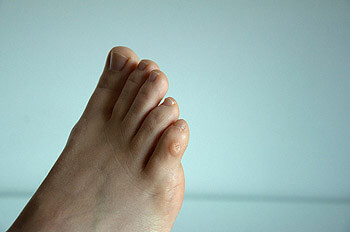Corns
Corns Treatment in Detroit, Sterling Heights, Hamtramck, Dearborn Heights, Madison Heights, Redford & Livonia, MI
 Corns are hardened bumps, normally found on the top or on the side of the toes. Some may also be found on the bottom of the feet. Corns are typically small and circular and have either hard or soft centers. Hard corns are generally found on the more firm areas of the foot, while soft corns are typically found in areas prone to be more moist, such as in between the toes.
Corns are hardened bumps, normally found on the top or on the side of the toes. Some may also be found on the bottom of the feet. Corns are typically small and circular and have either hard or soft centers. Hard corns are generally found on the more firm areas of the foot, while soft corns are typically found in areas prone to be more moist, such as in between the toes.
Corns Symptoms
You may have a corn if you notice a raised, hardened bump on your foot, skin that is dry and flaky or waxy, and feel pain or tenderness underneath the skin. There are many factors that play into why a person may develop a corn. Certain factors include wearing shoes or socks that are too tight, regularly walking barefoot or not wearing socks often, old age, or repeatedly jogging or exercising in a certain way that causes friction. Having other foot-related complications, such as hammertoe or bunions, can increase your risk of developing a corn.
While corns are often confused with calluses, there is a difference between them. Corns are raised bumps that consist of rough, thickened areas of skin that may be dry or waxy. They also tend to be surrounded by skin that is inflamed and are usually much smaller than calluses.
Corns Prevention
To prevent corns, the first step is reducing friction. Always wear shoes that fit well and don’t rub the feet. Wearing cushioned insoles in your shoes can also reduce friction. While there are many ways to prevent corns, it is best to consult a podiatrist with any questions you may have.
To help prevent the formation of corns, it’s recommended that you wash your feet daily with soap, water, and a scrubbing brush. It’s also useful to wear shoes that leave your toes with plenty of space, as well as cutting your nails straight across and not digging into the sides. Without certain footwear or lifestyle changes, it’s likely for a corn to develop again.
Orthotic inserts, which are fitted by a podiatrist, may also help with treating corns. Inserts fit right into the shoes and adjust the way the feet fit into the shoes, thus fixing the way one walks. Proper-fitting orthotics can help reduce friction, which can in turn help reduce corn formation and exacerbation.
Surgery is rarely used to treat corns, but does occur on occasion. Corn surgery deals with the underlying issue that causes corns to develop. During surgery, the bone is shaved and any abnormalities are corrected, thus reducing the amount of friction that occurs during walking.
If your corn is extremely painful or if you have diabetes or poor circulation, we recommend you seek professional help. Because the removal process is best done by a doctor, it’s important you seek the help of a podiatrist who can aid you in determining a treatment plan best suited for your particular case.




